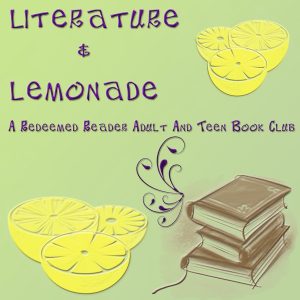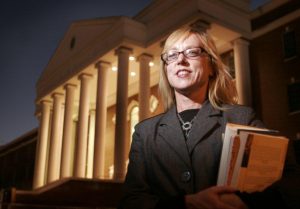Other Lemonade and Lit posts: Introduction, Week One: Booked, Week Two: Booked Discussion, Week Three: Beauty, Week Four: Sexuality in Booked, Week Five: Beauty Discussion, Week Six: The Last Thing I Remember, Week Seven: Klavan Discussion.
Lemonade and Lit:
An Adult-Teen Read Along, Week 2
 Last Saturday, Gina Dalfonzo of Breakpoint Youth Reads introduced our first read along book, Booked: Literature in the Soul of Me by Karen Swallow Prior. Today, I join Gina and two of our Redeemedreader.com interns, Joseph and Abby, as we consider last week’s discussion questions as well as readers’ comments from the introductory post.
Last Saturday, Gina Dalfonzo of Breakpoint Youth Reads introduced our first read along book, Booked: Literature in the Soul of Me by Karen Swallow Prior. Today, I join Gina and two of our Redeemedreader.com interns, Joseph and Abby, as we consider last week’s discussion questions as well as readers’ comments from the introductory post.
Just below the podcast, we’re also happy to offer Gina’s recent interview with author of Dr. Prior which also enriched our podcast discussion.
The Discussion
RR Podcast 31: Booked Discussion hosted by Emily Whitten
[powerpress]
The three voices on this week’s discussion, in addition to Redeemedreader host Emily Whitten, include these intrepid critics:
- Gina Dalfonzo is editor BreakPoint.org (including BreakPoint Youth Reads) and Dickensblog. Her work has appeared in “The Atlantic,” “National Review,” “The Weekly Standard,” “Christianity Today,” and “Guideposts,” among others.
- Joseph Murphy is a Redeemedreader intern and rising senior at Bryan College, where he studies history and political science. As a home school student during high school, Joseph was introduced to many of the great classics of literature. He continues to enjoy great books, both through classes and on his own. Some of his favorites include Jane Eyre, Les Miserables, and 1984.
- Abby Burns is also a Redeemedreader intern and a rising college freshman in Richmond, Virginia. She has had a love for literature her whole life, stretching all the way from Dr. Seuss to Dostoevsky. Unfortunately, like many readers, she had to learn at a young age that she could not survive on eating, sleeping, and reading alone. (She says she gave it her best shot, though!) Now she divides her time between her family, preparations for her first year of college, and work with her youth group. You can read more of her work at www.wordsoundimage.tublr.com.
Interview with Karen Swallow Prior by Gina Dalfonzo
 Q. In “Booked,” you use Milton’s argument for allowing a wide variety of reading, because “falsehood prevails through the suppression of countering ideas, but truth triumphs in a free and open exchange that allows truth to shine.” Can you give an example or two of this — among your students, for instance?
Q. In “Booked,” you use Milton’s argument for allowing a wide variety of reading, because “falsehood prevails through the suppression of countering ideas, but truth triumphs in a free and open exchange that allows truth to shine.” Can you give an example or two of this — among your students, for instance?
A. We can encounter an idea, a worldview, or an interpretation of an experience in a work of literature and, if the work is well-written, it will seem compelling and truthful. But the truth or even simply the completeness of that experience needs to be weighed against other ideas or perspectives. It’s no different in literature than it is in the world of political debate or doctrinal differences: “The one who states his case first seems right, until the other comes and examines him” (Proverbs 18:17).
This is one reason why historical context is so important to me in teaching literature. Many works of literature were written as responses to a previous work, each one delightful in its own right, but even more so when understood as part of an ongoing literary conversation. In fact, all literature is part of an ongoing human conversation. I think, for example, of how Henry Fielding’s satirical and neoclassical novel, The History of Tom Jones, A Foundling, was written as a counterpoint to Samuel Richardson’s sentimental and less elevated novel, Pamela. The novels that followed these two pioneering works synthesized the best elements of each and, in so doing, perfected the art of the novel which today communicates well so much truth about human experience in the modern age. One can look at traditions in poetry, too, and see warring worldviews such as the battle between Christopher Marlowe’s “The Passionate Shepherd to His Love” and Sir Walter Ralegh’s “The Nymph’s Reply to the Shepherd.” Each poem is great on its own and conveys some truth–but the fullest picture of truth about love and romance emerges out of a consideration of both poems together.
Q. You write about the importance of making “discerning judgments of literature.” What are some ways that a young reader can develop such discernment?
A. I think the best way is given in the answer above: by reading competing, divergent works on a comparative way. This, of course, requires some guidance from parents, teachers, and more experienced readers, but what important undertaking in life doesn’t require guidance and instruction? More informally, reflecting on what one reads–whether in a journal, discussion, or simply in conversation–is important. Reading critically–engaging actively with literary texts–is a practice that needs to be intentionally cultivated. It can be practiced in other areas of life, too, by incorporating reflection into all forms of entertainment: discussing television shows, movies, and commercials, for example. An attitude of critical reflection rather than passive consumption can be cultivated in all areas of life. This develops discernment.
Q. One especially good point in the book is this: “Not everyone appreciates the magic of Great Expectations, but that’s the thing about magic: it doesn’t work on everyone. In order for magic to work, first you have to believe.” If a young reader has trouble picking up on the magic of some of the classics when reading them, what would you advise him or her to do? Try the book again, put it down and come back to it later, read it with someone else, try a different book, or something else?
A. As I show in Booked, my taste in reading as a youngster was all over the map. I think that reading should first of all be enjoyed, so I would encourage readers to read what they like most of all. This doesn’t mean that no effort should go into cultivating and developing taste and skill in reading. I do the same thing for myself. Every few books I read are ones that are not necessarily to my taste or challenge my skill level, books I read in order to stretch and challenge myself as a reader, something I hope I will never stop doing. I think it is fine to put a book down and pick up another one if the reading has become such a chore that you actually avoid reading.
The thing about reading is that the more one does it, the better one can become at it. So it you put one book down and read a dozen more instead, you might be able to come back to that earlier one and get more out of it later on. If not, at least you’ve read those dozen other books. But I would encourage every reader of every age and level to determine to read a certain number of books that challenge rather than just entertain. Most of the reading should be for pleasure, however.
Q. Much of “Booked” is about the role that books played in your journey of self-discovery, as well as your journey toward God. Could you describe some of the benefits of having books to guide you along the way, as well some of the limitations that they had (if any)?
A. As central as books have been to my spiritual and personal development, they are a form of natural revelation not special revelation. Nothing can take the place of the Person of Jesus Christ, the work of the Holy Spirit, or the power of God’s Word. But He created this earth, put us here, and filled this place with things for us to enjoy and to glorify Him with. I marvel at how God used books to reveal Himself to me in a sideways fashion during those years when I was avoiding Him (or so I thought). While God can use other things in the world to teach us about Him (the natural world, people, etc.), I do believe that there is something intrinsic to words–all words–that is tied to the very nature of God (the Word) and the way he relates to us.
Q. If you were teaching high school instead of college, what are some of the books you would want to teach that age group? Why?
A. I did teach high school English for one year and was the school principal for six years after that, so I do have a little bit of experience working with that age group. Some of the classics that I think are both important and enjoyable for high school students include Great Expectations, 1984, Lord of the Flies, To Kill a Mockingbird, Invisible Man, Night, The Diary of a Young Girl, All Quiet on the Western Front, and Jane Eyre. Most adolescents relate easily to the themes of oppression and marginalization that are central to most of these works. I think these books can attract teen readers through these themes, but at the same time lift them up out of themselves in order to look at larger, more enduring social, political, and human issues. Isn’t this what all great literature does?
Thanks so much to Karen, Gina, as well as Joseph and Abby and all the readers who left comments on Dr. Prior’s books! For those of you who have read the book or listened to our discussion, have you learned anything from the experience? Any questions or comments that you’d like to pass on?
Over the next few weeks, we’ll be reading Beauty by Robin McKinley. For further reading, feel free to check out our entire section of YA reviews, as well as our other author interviews and podcasts. And have a great weekend!
Support our writers and help keep Redeemed Reader ad-free by joining the Redeemed Reader Fellowship.
Stay Up to Date!
Get the information you need to make wise choices about books for your children and teens.
Our weekly newsletter includes our latest reviews, related links from around the web, a featured book list, book trivia, and more. We never sell your information. You may unsubscribe at any time.
We'd love to hear from you!
Our comments are now limited to our members (both Silver and Golden Key). Members, you just need to log in with your normal log-in credentials!
Not a member yet? You can join the Silver Key ($2.99/month) for a free 2-week trial. Cancel at any time. Find out more about membership here.
3 Comments
Leave a Comment
You must be logged in to post a comment.


Loved her statement that: “The thing about reading is that the more one does it, the better one can become at it.” Such encouragement for me to continue to press on as I try to pass along my love for books and reading to my kiddos.
Glad you pointed that out, Melissa. I agree!
I love the point of getting better at reading. I certainly know that to be true in my life. I often wish I could go back to college and read all those books again; I know I would understand so much more!